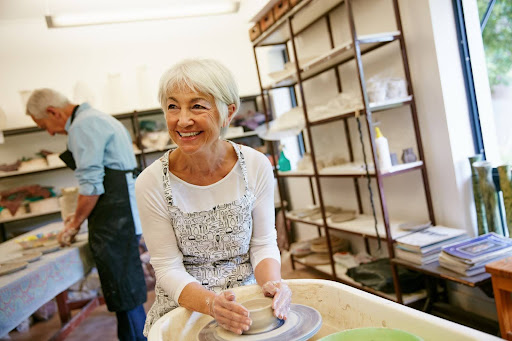How Seniors Benefit from Lifelong Learning
Date: February 20, 2024 | Article | Reading Time: minutes
One of the most exciting parts about retirement is that you can choose to do whatever you want, whenever you want. Whether it’s trying new activities, going on trips, or spending more time with family and friends, retirement is like hitting the reset button on life. Growing older doesn’t mean you should stop finding ways to live happily!
One way older adults find joy during their retirement years is through lifelong learning. In fact, the ability to learn new information may even be easier with more free time to dedicate to your pursuit of knowledge.
Learn more about lifelong learning, its different forms, and how we prioritize lifelong learning for residents at The Delaney® at The Green.
What Is Lifelong Learning?
Lifelong learning for seniors refers to continued education, skill refinement, and personal development throughout their retirement years. It encompasses formal and informal learning activities that seniors engage in to enrich their lives, expand their horizons, and maintain mental, social, and emotional well-being. Lifelong learning for seniors can take various forms, including:
- Formal education
Seniors who consider themselves lifelong learners may enroll in traditional academic courses at educational institutes like universities, colleges, or community centers. Many institutions offer discounted or free programs for seniors.
- Online learning
With the advent of technology, seniors can access a wide range of online courses, webinars, and educational resources tailored to their interests and abilities. This is also a great platform for learning a new language!
- Workshops and seminars
Local community centers, libraries, and senior living communities often host workshops, seminars, and lectures on topics ranging from art and literature to health and technology.
- Hobbies and creative pursuits
Seniors may pursue hobbies such as painting, gardening, photography, or music, which provide opportunities for self-expression and continuous learning.
- Volunteering
Volunteering in schools, museums, or nonprofit organizations allows seniors to contribute to their communities while learning new skills and gaining valuable experiences.
- Travel and cultural experiences
Traveling to new destinations, attending cultural events, and exploring different cuisines can broaden seniors’ perspectives and expose them to new ideas and ways of life.
- Intergenerational learning
Seniors can engage in intergenerational activities, such as mentoring programs or intergenerational learning initiatives, where they share their knowledge and skills with younger generations while also learning from them.
- Reading and research
Reading books, newspapers, and online articles on various subjects keeps seniors intellectually engaged and informed about current events and developments.
Overall, lifelong learning for seniors is about embracing curiosity, staying intellectually active, and continuously growing and evolving, regardless of age or retirement status. It fosters personal fulfillment, social connection, and a sense of purpose in later life.

What Are the Benefits of Lifelong Learning for Seniors?
Lifelong learning offers a multitude of benefits for retired seniors, including:
1. Cognitive health
Engaging in learning activities keeps the mind active and sharp, reducing the risk of cognitive decline and different forms of dementia like Alzheimer’s disease (Johns Hopkins Medicine).
2. Social interaction
Lifelong learning provides opportunities to meet new people, make friends, and engage in meaningful social interactions, combating loneliness and isolation.
3. Personal fulfillment
Learning new skills or subjects can bring a sense of accomplishment and fulfillment, boosting self-esteem and confidence.
4. Improved overall health
Continuous learning has been linked to improved overall health and well-being, including better emotional resilience and a reduced risk of depression.
5. Adaptability
Learning new things helps seniors stay adaptable and open to change, which is essential in navigating the challenges of aging and staying relevant in a rapidly evolving world.
6. Increased quality of life
By staying mentally, socially, and physically active through lifelong learning, seniors can enhance their overall quality of life and maintain a sense of purpose and vitality in their retirement years.
7. Legacy building
Seniors have a wealth of knowledge and life experience to share. Lifelong learning allows them to pass on their wisdom and skills to younger generations, leaving a lasting legacy.
Lifelong Learning Opportunities at The Delaney® at The Green
At our senior living community, residents take part in immersive experiences and engaging programs like educational seminars, cultural outings, arts and crafts classes, and many more opportunities to fulfill their lifelong learning goals.
We also have a wonderful relationship with nearby Fairleigh Dickinson University, where seniors 65 and older can enroll in courses alongside traditional undergraduate college students through The Florham Institute for Lifelong Learning (FILL) program.
Pursue Lifelong Learning in Florham Park, New Jersey
Residents at The Delaney® at The Green are engaged seniors who are committed to lifelong learning and staying active. To learn more about our lifestyle, contact us today to schedule a visit.
